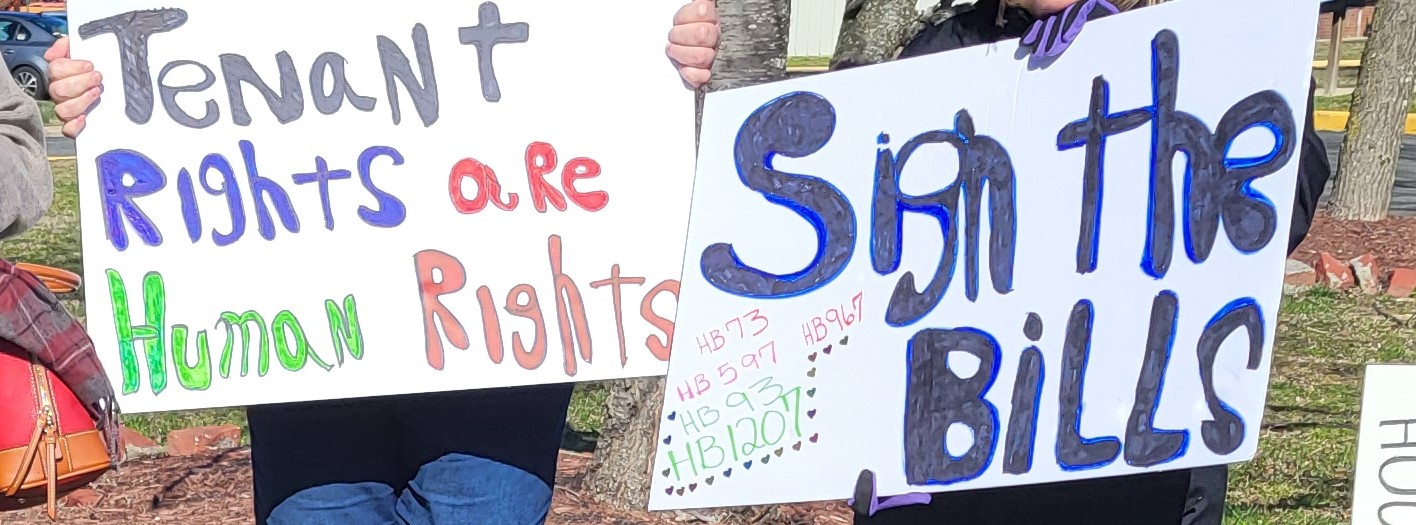
A slew of seven housing bills are now on the governor’s desk, those who stand to benefit express their desire that Youngkin act positively on them.
A steady, cold wind blew through the group of about a dozen individuals Monday morning who had gathered outside the Thurman Brisben Center to make a simple request of Gov. Glenn Youngkin – “Sign the Bills.”
The bills themselves cover a range of issues, from empowering local authorities to hold landlords accountable for their handling of tenants and their properties, to giving renters more time to pay rent, and prohibiting fees for maintenance/repair projects or for submitting rent payments, among others. (For a list of the bills that Monday’s demonstrators are urging the Governor to sign, see below.)
But for one demonstrator, the bills are about one thing – “Dignified housing.”

We are asking, a young Hispanic woman with legal standing in the U.S. told the Advance, for “basic accessibility to electricity, water, bathrooms, rooms so you’re not on top of each other,” and prices that make sure these livable spaces are available “for people of all incomes.”
She came to the U.S. as an immigrant and says that the major challenges to securing dignified housing are the “language and culture” barriers she and other Hispanics face.
“There are places,” she said, “that don’t rent to Hispanics or people of color.”
There are economic challenges as well. She reports that though she has a number of ways to generate the income she needs to pay her bills, she can’t produce the proof of income that many landlords require, making finding housing even more difficult.
Compounding the problems faced by people who struggle to find housing are Virginia’s restrictive zoning laws. In a column for Pew, Alex Horowitz notes that “cities and towns … with restrictive zoning that allow only single-family homes in most areas and that restrict apartments tend to be less affordable and have lower shares of Black and Hispanic residents, excluding people from the schools, jobs, and opportunities these communities offer.”
David Cooper, CEO for the Brisben Center, sees families who have been cut out of the housing market and find themselves with no place to turn. He said that Jorge Mendez, the Fredericksburg organizer for Virginia Organizing who put on Monday’s demonstration, asked to hold the event in front of Brisben because it serves the population that is being evicted.
We do have our success stories, Cooper says, noting that his board is composed of some of those people who have found their way to more successful lives thanks to the services Brisben offers.
“Brisben is focused,” he said, “on equipping/preparing its participants to be good tenants, neighbors, business patrons, and employees.”
As for the young Hispanic woman who spoke with the Advance, she is simply hoping that “the leaders who are writing these bills take into account [the] immigrants [who] at the moment [are] applying for an apartment or townhouse” and understand the problems these people are facing.
“Hispanic/Latino people help this country progress,” she said, “and having a place to rest” is critical to helping them continue to be “the motor that runs this country.”
The bills that Virginia Organizing is asking Youngkin to sign are:
- SB 479 (Aird) and HB 597 (Price): Expands local authority to hold landlords accountable.
- HB 73 (Hope): Expunges dismissed eviction actions from tenants’ records.
- HB 442 (Bennett-Parker): Allows payment plans for one month’s late rent.
- HB 598 (Price): Allows late rent payments up to 14 days.
- HB 817 (McClure): Prohibits retaliatory actions by a landlord against a tenant.
- SB 422 (Ebbin) and HB 993 (Tran): Prohibits fees for maintenance/repair or fees to submit rent payments.
- HB 1251 (Cousins): Limits escrow requirement for tenants’ assertion cases.





